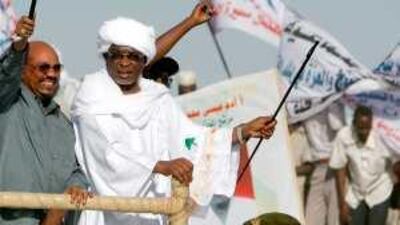NAIROBI // One year after Omar al Bashir, the Sudanese president, was indicted for war crimes in the western Darfur region, the violence there continues to linger. Clashes have erupted in the past week despite a ceasefire deal signed last month between the government and a major rebel group.
As the international community shifts focus to the tense standoff between north and south Sudan before next month's elections, observers are worried that the country could see a return to fighting in Darfur. At least 300,000 have been killed in Darfur and millions displaced since fighting began in 2003, according to the United Nations. Khartoum says 10,000 have been killed. The latest fighting has left a further 100,000 in flight.
Last year, the International Criminal Court in The Hague issued an arrest warrant for Mr al Bashir for crimes against humanity. Genocide charges remain possible. In response, Mr al Bashir kicked out 13 international aid organisations operating in Darfur. Sudanese humanitarian organisations stepped in to provide relief and averted a disaster in the vast arid region, according to the UN. Many villages in Darfur have been razed by the government-backed Janjaweed militias, who are fighting Sudanese rebels over land and scarce resources.
"The government - stepped in and really took on a lot of the work that has been carried out by the organisations that were expelled from Sudan," said Toby Lanzer, the UN humanitarian coordinator for Darfur. "Paradoxically, the expulsion forced us to work closer together [with the government] and that is one of the main reasons why there was no catastrophe." The government signed a ceasefire deal in February with the Justice and Equality Movement, one of the main rebel groups, paving the way for peace talks in Doha. But another rebel faction, the Sudan Liberation Army (SLA), has refused to negotiate. Analysts are doubtful that a peace process will last without all the rebel groups at the table.
"Everyone wants to see these peace talks succeed, but the list of failed agreements in Sudan is long, so enthusiasm must be tempered with realism," said John Norris, the executive director of the Enough Project, an advocacy group. The SLA has clashed with government troops in the past two weeks, reports say. The latest fighting in the Jabel Marra region caused 100,000 to flee their homes, according to aid workers. The rebels said the government attacked their positions from the air.
"The government attacked in huge numbers backed up by Antonovs, helicopter gunships and MiGs," Ibrahim al Hillu, an SLA spokesman, told Reuters. "This is the peace the government is offering." The United States last week accused the Sudanese government of violating a UN arms embargo. Washington has its own sanctions against Sudan and has pressured Khartoum to end the conflict in Darfur and adhere to a peace deal with southern Sudan.
"We know that weapons continue to flow into Darfur, acts of sexual and gender-based violence continue unabated and with impunity; military over-flights and offensive actions continue," Susan Rice, the US ambassador to the UN, told reporters in New York. "The blatant disregard of the will of the [Security] Council is undermining stability rather than fostering it, which was the aim of the [sanctions] regime in the first place."
The flare-up of fighting in Darfur comes one month before Sudan begins voting in its first presidential election in more than 20 years. Most of the country is already tense in the run-up to the polls, which analysts say could spark renewed hostilities between the north and south. The two sides fought a 20-year civil war that ended in 2005. Observers are worried that Darfuris could be disenfranchised during the election. Many Darfuris live in squalid displacement camps, where voter registration has been problematic.
Despite the indictment, Mr al Bashir is running for re-election. One of his strongest challengers, Sadiq al Mahdi, the prime minister who was ousted by Mr al Bashir in a 1989 coup, has been censured for speaking about the ICC indictment. Jerry Fowler, president of the Save Darfur Coalition, a US-based advocacy group, recently returned from a trip to Darfur and said it would be difficult to hold an election in the current climate.
"Darfur remains under a state of emergency, and the environment there is one of generalised insecurity, with a lot of people running around with guns, so it is not at all conducive to any meaningful elections," he said in a video posting on the organisation's website. "The problem is the playing field is so unlevel to begin with that simply holding an election does not mean the results will be credible."
mbrown@thenational.ae

